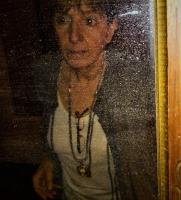From Adame
In the spring of the year I found myself riding, riding. I was riding hard; there was sweat on my brow, and sweat on the brow of my horse. The past was losing its nearness, its propinquity, its closeness, its blood relationship.
I felt myself bound to humanity, bound in haziness and ambiguity. I asked what will come of it, a voice answered nothing ever comes of it, and so I asked what can I know with certainty.
You can know you are Adame.
I am Adame
Oh, so you are Adame
And you are…?
And I am…?
You can’t fool the girl, I say.
It is all décombres. Rubbish. Ruins. It is like the residue or matter of a ruined and crumbling building. I am in that unexpected house, the house with the windows through which the birds fly in and out, night and day.
The horse was white. It was summer. The horse was a magnificent animal. The day was perfect. A man was riding with me. He was neither lord, nor master, nor sire. He was my aide-de-camp. He functioned also as my aide-mémoire. I said to him the trees are beautiful in this forest and must not be forgotten. And the little stream which comes out of the ground must not be forgotten. With his eyes he recorded, with his ears he recorded. With his eyes and his ears he recorded what I said.
My father lifted me onto the horse. It was one of those amusement parks for children where as a child I could be lifted onto a horse and then led around in a circle where in front of and behind me there were other children on other horses. My father watched from the sidelines as the handler led me slowly. My father’s camera hung from a strap around his neck. When the handler brought me near, my father took my photograph. The day a remnant now burned into memory by my father’s photograph.
I might have been a girl or a boy. The innocence of the fairy tale. And later the hardening as into a fist of my life’s form.
I might have been a girl or a boy entering the house of crazy mirrors, the reflections used to send me into uncontrollable fits of laughter, grotesque images of me, it was me and at the same time it was not me. Ha ha ha. Ha ha ha, I laughed. But that was not the true sound of my laugh. I practiced laughing everyday, bringing it up from deep inside, loud and unnatural, HA. HA HA.
One day the Laughing Master said to me: A laugh is a real thing. A laugh is not a giggle.
I walked through a wall in the house of crazy mirrors. I was closed inside the wall before I made it to the other side. I said, I’ll have to live here now. I’ll have to manage as best I can. Everything had stopped moving, all that would make safe passage out possible had stopped. Some words are too specific for fairy tales. Though all words must have specificity if they are to attain visibility. The movement started up again and I continued along my way.
The amusement park had emptied out. Everyone was gone. The world had imagined a beast in its worlding. Was that the sun? Was that the moon? I was sitting in the quiet with all noise ended.
I slipped into the night.
I turned with gravity towards the beginning.
The permeability of the fabulists
There is often a beast in a fairytale.
Or as Wu Wei said: The development of organisms along the lines that lead to ever greater complexity and consciousness.
It was a thought that had escaped me. Like a runaway horse returned to its wildness.

Rosalind Palermo Stevenson is the author of the novel The Absent, the novella Insect Dreams, and the chapbook Kafka At Rudolf Steiner’s. She has published fiction and prose poetry in literary journals including Web Conjunctions, First Intensity, Drunken Boat, La Piccioletta Barca, Skidrow Penthouse, Spinning Jenny, Washington Square, Literal Latte, and Quick Fiction, among others. Rosalind lives in New York City where she is currently writing a book which continues her poetic exploration of the fragmented and the episodic, and in which past, present, dreams, and reality coagulate into one another at the intersection of speculative fiction and autobiography.


